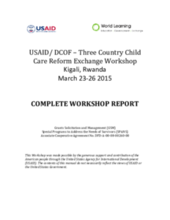The United States Agency for International Development (USAID) through its Displaced Children and Orphans Fund (DCOF) supported a sub-regional workshop held in Kigali March 23-26, 2015 to provide structured opportunities for technical exchange on care reform, approaches, methods, and tools. The workshop was designed to provide opportunities for exchange and to develop connections among personnel of the five care reform projects of USAID/DCOF in Rwanda, Burundi, and Uganda, as well as representatives of the three governments. It was planned with the active involvement of a Steering Committee that included representatives of the three countries. Participants included representatives of government departments, international and national non-governmental organizations implementing USAID/DCOF projects, UNICEF, and universities.
The workshop was held in Rwanda, which has become a leader in child care reform in the region, providing an opportunity for Burundi and Uganda partners to learn from Rwanda’s country efforts, while also sharing learning from their respective countries. Workshop participants made a field visit to Rubavu, a district in the Western Province, where they engaged in structured, facilitated two-way discussions with Rwandan front-line social workers, psychologists, government officials, community residents, and others to understand the activities and methods used on site. Rubuvu was selected as site for a field visit because it had the largest institutional child care facility in the country, with over 500 children and young adults, which has been closed through the prevention and reintegration work of the two USAID/DCOF-funded projects in Rwanda.
During workshop sessions in Kigali, participants engaged in facilitated exploration of ten priority topics related to care, which had been identified by the Steering Committee as highly relevant to care reform work in the three countries:
1. The role of the social workforce in conducting case management and leading deinstitutionalization in an integrated child protection system.
2. Methods to identify households with children at highest risk of a child separating to go into residential care or onto the street.
3. How to engage faith based communities in the transformation of current residential care institutions into community child rights service providers.
4. How to match household economic strengthening measures with households' needs and capacities in order to prevent unnecessary separation and to support effective reintegration.
5. Methods for monitoring the safety and wellbeing of children placed in family care (family of origin or another family).
6. The tools and process of documenting individual children in residential care.
7. Assessment and mediation prior to placement of a child in a family.
8. Methods for tracing families of origin or extended family members.
9. The importance of community-based services in sustaining placements and promoting child rights.
10. Preventing institutionalization and reintegrating children with disabilities.
These topics represented key technical challenges in programming. They are reviewed in the following sections. DCOF’s implementing partner for the workshop, World Learning (WL), organized and managed the logistical and administrative needs of the workshop through its USAID/ DCHA/DRG/ Empowerment and Inclusion Division’s Grant Solicitation and Management (GSM) program. In country, World Learning’s SIT Graduate Institute, which operates education programs in Rwanda, provided administrative and logistical planning support for the workshop.

